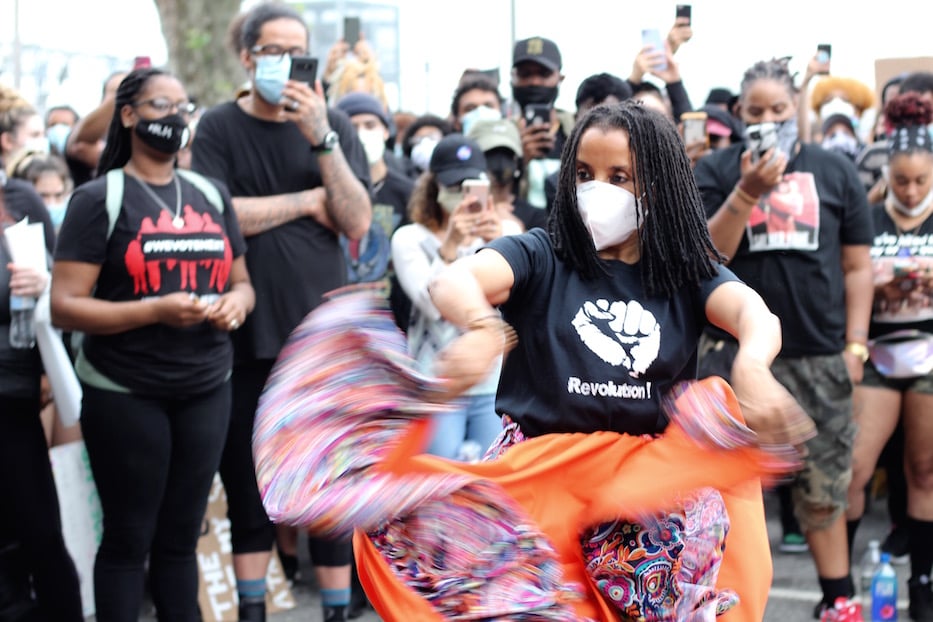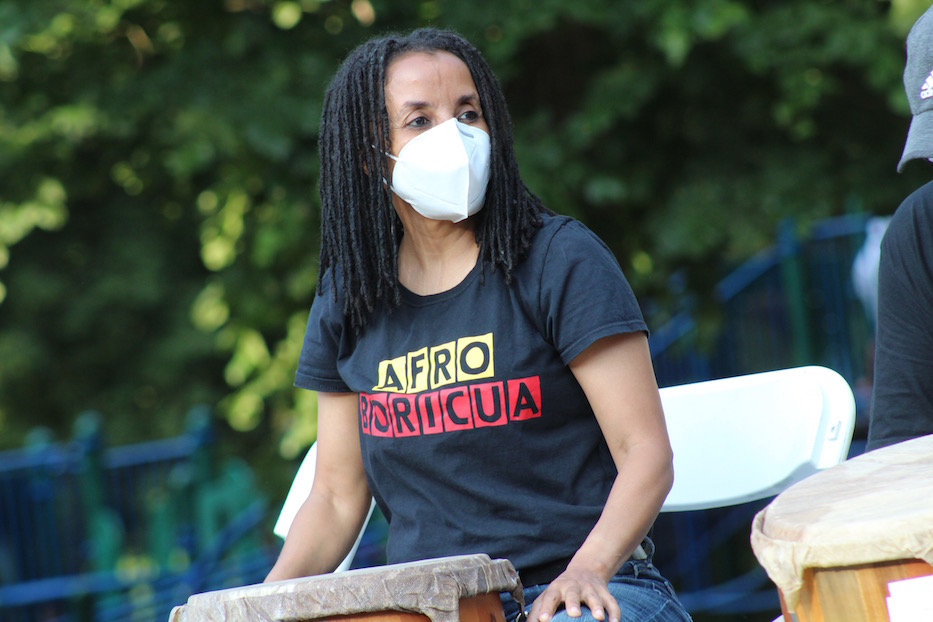
Boricua pride | Immigration | Black Lives Matter | Census 2020 | COVID-19

| Kica Matos at a rally in June led by Citywide Youth Coalition. Lucy Gellman File Photo. |
This is part of a series of interviews with New Haven artists about the U.S. Census. In installments, artists answer the same questions about the Census, which determines the amount of federal aid allocated to New Haven. To read more of these interviews, and learn about the role artists are playing in New Haven’s census effort, check out the Census 2020 tag.
When the census arrived in Kica Matos’ mailbox—or it may have been her inbox—she talked to her husband Henry about the importance of filling it out. Then she had the same talk with her son Henry, a sophomore at New Haven's Engineering and Science University Magnet School.
Matos is a bomba dancer, drummer, legal advocate and immigration rights activist in New Haven, her home base for statewide and national advocacy work as the vice president of initiatives for the Vera Institute of Justice. Over the summer, she was a frequent fixture at protests, marches, and teach-ins, where she often stepped into the batey and helped teach bomba as the heartbeat of resistance.
For her, filling out the census is a critical part of that resistance. Earlier this year, the U.S. Census Bureau announced that it will stop counting census respondents on Sept. 30, a month earlier than previously planned. Any mailed in responses must arrive by October 7 to be considered.
Held every 10 years and mandated by the U.S. Constitution, the census is intended to count every person in the country and collect data for the proper allocation of federal funds and drawing of legislative districts. In 2002, the state lost a representative in its fifth congressional district following a lower count on the 2000 census.
It also determines how much money each state receives from the federal government. In other words, it directly impacts New Haven’s access to Medicaid, Medicare, Head Start early childhood education, Supplemental Nutrition Assistance Program (SNAP) food benefits, and other essential federal benefits programs.
New Haven leaves roughly $2,900 on the table for every person not counted. In 2010, some 40,000 New Haveners were left out. In January 2020, Mayor Justin Elicker expressed a concern that undocumented immigrants, fearful of the Trump administration, would not fill out the census. When COVID-19 hit the city, those counting efforts became an even greater hardship. As of Sept. 7, only 52.7 percent of New Haveners had completed the census.

| Matos performing at a Juneteenth teach-in in East Rock Park. Lucy Gellman File Photo. |
Have you completed the census?
Yes! I completed it months ago.
How do you identify personally, and how did you identify on the census?
I identify as a Black Latina. I identified on the census as a Black Latina, and I identify generally as an Afro-Boricua. So as a Black Puerto Rican woman.
And did you feel like it gave you space to do that?
Yes! You identify your ethnicity, and you can also identify by race. So ethnic-wise, I identified as Latina. And then on race, I checked off the box for Black. I’m very clear about my race. I have always been, and until the day I die will be, Black. I am proudly Black. I think part of my proud self-identification stems from the fact that far too many Puerto Ricans who should racially identify as something other than white identify themselves as white on the census.
There have been efforts around the 2020 Census in Puerto Rico to encourage Black Puerto Ricans to self-identify as Black. I actually have a t-shirt that was designed by a social justice group in Puerto Rico that has the census identification [boxes] and it crosses off Black and Latina.
We have a long way to go when it comes to racial pride and racial identity in Puerto Rico, and I’m glad to see Puerto Rican groups taking that on.
Did you find any challenges completing it?
No. It was really straightforward.
How many censuses have you completed?
I came to the U.S. in 1988, and so I want to believe that I filled out the 1990 census. I was in New York City at the time. From what I recall, since 1990 I’ve made an effort to fill out the census whenever it comes around.
What was your first experience with it?
I’ve always found the census to be really straightforward. I think during the last census, we were identified as one of the households that had to fill it in with more detail—the American Community Survey—and that was much more detailed and much more nuanced in terms of the questions that they asked.
When and where did you first learn about the census?
You know, I don’t really know. The census is one of those things like voting—I feel like I’ve always known. It’s just one of those things that you do as your civic duty, and as a way to participate responsibly in a democracy. So I don’t know when I did not know about the census.
What do you think people in your family or your immediate community think about the census?
What I would say about my immediate family is that we’ve always taken it really seriously, and so we have always set aside the time and made the effort to fill out the census. It doesn’t really take that long. For this census, I’ve been involved in efforts for the last two years or so to try to encourage immigrants in particular to fill it out. We were very intentional about fighting back the efforts of the current administration to include a citizenship question, because it was obviously a way to try to intimidate immigrants from participating and to disenfranchise people in our communities.
As soon as the census came, I filled it out immediately. I let Henry [Fernandez, who is the director of LEAP and also her husband] know and we talked to our son Henry about filling out the census.
Do you think there’s a distrust around the census?
Particularly so around this last census, and that was on the part of the [Trump] administration. The first rumors we heard about the administration’s efforts to try to intimidate people from participating were that there were conversations in D.C. about the possibility of coupling the census with enforcement efforts. And what we heard was that the administration was really exploring the possibility of census takers partnering with ICE [Immigration and Customs Enforcement] to carry out enforcement actions during the census.
That was the first whiff that we got of the administration’s efforts to really dissuade immigrants and Latinos, particularly immigrants and Latinos, from participating. Shortly thereafter was the announcement that there would be a citizenship question that was going to be included.
I was still working at the Center for Community Change. And that’s when we pivoted as an advocacy organization, to both encourage people to take the census and to fight against the citizenship question.The last time the citizenship question was included before this was in 1950.
Do you remember any myths that you heard about the census growing up?
No.
How do you think the census could be improved?
I think that the U.S. Census Bureau should start tackling hard-to-count and hard-to-reach populations much earlier in the process. There are already documented groups that are hard to reach and hard to count. And so, I think the bureau should work with local governments to try to figure out how to address those barriers. Not the year before, but long before it’s due.
We know people of color in particular are dissuaded from participating for a number of reasons. We know immigrant populations are hard to reach. We know people who are constantly mobile are hard to reach. We know people who live in apartment buildings are hard to reach. If we have that data available, then we should be doing something about it as opposed to simply acknowledging that they’re hard to reach, hard to count populations.
Our democracy relies in part on the census, right? It is part of what shapes representation in government, and it is part of what shapes allocation of economic resources. And we should really be taking those things seriously. I would go so far as to say that we shouldn’t just try to pressure the Census Bureau to set aside resources for those things. We in New Haven should own it, and have a responsibility for figuring out how we in our own city should try to meet those needs.
And not at the last minute. Not thinking: "Oh my God, the census is next year!" Or:
"The census is gonna be rolled out in a couple of months!" Between now and the next census 10 years from now, we need to begin to figure out how we systematically address the hard-to-count groups and the barriers to being counted.
Are there questions that you would like to see that currently aren’t in the census?
You know, I was really struck about the questions regarding sex and gender. I’m surprised that you have two options. You’re either male or female. And I would strongly encourage the census to consider that not everybody identifies like that. This is not a binary world—there are people who don’t fit that category. So to think about including “intersex” and “prefer not to answer.”
People also have a gender identity that’s not being addressed. It can be alienating when you don’t see yourself. You’re asked to fill out this box, and you don’t see yourself represented there. I would encourage the Census Bureau to think about including the gender identity section. It could include: woman, man, transgender, non-binary, nonconforming, as well as “prefer not to answer.”
I also think for purposes of research and analysis, it’s important to have that information reflected. The census is important for political and economic reasons—but a lot of research is also done by using the census data. The census data is considered really reliable data. It’s used by researchers, and people use it for all sorts of reasons. So there should be some examination of gender identity that can be used by researchers, to have a better sense of who we are and how we identify.
What would you tell folks who are still skeptical about filling out the census?
To fill it out as though your life depended on it. I say that in the most serious way. I am worried about the increasingly fragile democracy that we have in the United States. I was appalled, and horrified, and disgusted by the efforts of this current administration to try to disenfranchise immigrant voters and people of color through the citizenship question. These are intentionally racist and political efforts. And if we don’t fill out the census, we don’t count.
If we don’t count, that means we don’t benefit from political participation in terms of representation on the federal level. We don’t benefit from the resources that should be due to us from the federal government. So I have been encouraging people to fill out the census for months now. I just think it is absolutely critical.
The census involves tax money, and dictates where that tax money is going. In an imaginary world where we’re all talking about where that tax money is going, how do the arts figure into that?
I’m a huge proponent of the arts. The arts feed my soul in a way that nothing else does. And I think that we should think of the arts as something essential to our Democracy and our way of being.

